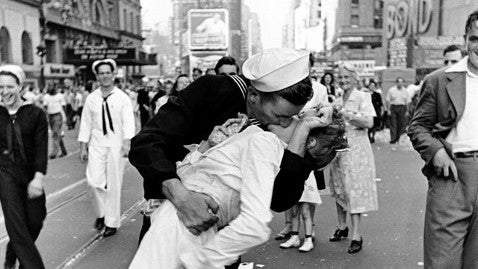
The Department of Veterans Affairs disavowed a memo from a senior official requesting that VA facilities remove any displays of a famous photo commemorating the end of World War II. The picture captures a sailor kissing a woman in New York City’s Times Square on V-J Day. Modern views of the picture include criticism that it may capture a non-consensual moment.
“Let me be clear: This image is not banned from VA facilities – and we will keep it in VA facilities,” VA Secretary Denis McDonough said in a tweet. A VA official told Task & Purpose that the memo should not have been sent to VA facilities but did not specify if the memo was initially approved for distribution by senior officials before being reversed, or if its initial circulation was unauthorized.
The memo by RimaAnn Nelson, the Veterans Health Administration’s top operations official, “requested” that VA facilities remove the “non-consensual act” depicted in the “V-J Day in Times Square” photograph.
“In celebrating the end of World War II and the valiant service of our Veterans, facilities should seek alternate photographs that capture the spirit of victory and peace without compromising the VA’s commitment to a safe and respectful environment,” the memo said.
As the assistant undersecretary for health operations, Nelson has oversight of the daily workings in many VA facilities. She is a career VA employee who has spent almost three decades at the VA. She was not appointed to her position by President Joe Biden.
V-J Day, a dental aide and an engaged sailor
The woman depicted in the photo, Greta Friedman, died in 2016 at age 92. In a 2005 interview with the Library of Congress, Friedman described the moment as surprising, unasked for, and lacking any romance — but she is relatively ambivalent on the question of consent. The interview also adds several dramatic notes about the moment often left out of its history.
“It wasn’t my choice to be kissed,” Friedman told the Library of Congress. “The guy just came over and kissed or grabbed.”
Though often described as a nurse due to her white uniform, Friedman was a dental assistant in New York City. She was working for two dentist brothers and slipped out to Times Square after arriving patients mentioned rumors that the Japanese were officially surrendering.
“All morning long people would come in and say there seems to be rumors that the war is ending. And since I wasn’t very far from Times Square, I could just walk over there and see for myself. And so after my bosses came back at 1:00 from their lunch hour, I went straight to Times Square where I saw on the lighted billboard that goes around the building, ‘V-J Day, V-J Day.’”
While in the square, a man she’d never seen before suddenly grabbed her.
“I felt he was very strong. He was just holding me tight, and I’m not sure I — about the kiss because, you know, it was just somebody really celebrating. But it wasn’t a romantic event. It was just an event of, thank God, the war is over kind of thing.”
The sailor, Friedman said, never said a word and almost immediately disappeared.
“It was just an act of silence,” she said. “We both left, went on our own way.”
Also: he was engaged.
“I found out later that he and his fiancee, I think at the time, they probably were engaged already, they had come from Radio City Music Hall. They also heard that the war was over. So they just left the show. They never even saw the whole show and went to Times Square because if you needed to know the latest news, there it was.”
Subscribe to Task & Purpose today. Get the latest military news and culture in your inbox daily.
The sailor, widely believed to be George Mendonsa, did eventually get married, Friedman said, and the two kept in touch, including exchanging occasional Christmas cards.
“We’re not friends who see each other, but through this happening, you know, we have something in common,” she said. “It wasn’t that much of a kiss, it was more of a jubilant act that he didn’t have to go back. I found out later, he was so happy that he did not have to go back to the Pacific where they already had been through the war. And the reason he grabbed someone dressed like a nurse was that he just felt very grateful to nurses who took care of the wounded.”
An iconic image
In the decades since, the image has become iconic of both military service and the joy of the end of a world war. A 25-foot-tall statue of the sailor kissing the woman sits on the San Diego waterfront, near the now-decommissioned USS Midway.
But others have seen in the picture a thoughtless celebration of a moment when a woman was grabbed, kissed, and photographed without any regard for consent or privacy.
Reactions on social media blasted the VA memo as historical erasure and a bow to “woke” cultural ideologies. The full memo was tweeted by several accounts including the account “EndWokeness” on X.
The memo misstep comes just a month after McDonough faced a public outcry over sexual harassment in the department. In Congressional testimony, McDonough acknowledged the VA’s failure to address sexual harassment claims made by an employee in the office that investigates such claims.
The latest on Task & Purpose
- Sailors at Norfolk will be locked out of their rooms if they fail inspection
- Army Reserve colonel allegedly pocketed $62,000 in fake rental property scheme
- Army quietly dropped 5-mile run requirement from airborne school in 2018
- Alaska paratroopers get a secret weapon for the arctic: beards
- Army will add 17 air defense units while cutting 24,000 active duty spots
